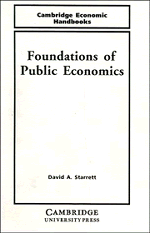Book contents
- Frontmatter
- Contents
- Preface and acknowledgments
- Notation
- PART I Scope and limitations
- PART II Decision making in a mixed economy
- PART III First-order project analysis
- 9 Decompositions and general theory of second best
- 10 Principles of shadow pricing
- 11 Local public goods
- 12 Intertemporal contexts with uncertainty
- 13 Identifying shadow values: hedonic methods and capitalization
- PART IV Evaluating large projects
- Epilog
- References
- Author index
- Subject index
12 - Intertemporal contexts with uncertainty
Published online by Cambridge University Press: 04 April 2011
- Frontmatter
- Contents
- Preface and acknowledgments
- Notation
- PART I Scope and limitations
- PART II Decision making in a mixed economy
- PART III First-order project analysis
- 9 Decompositions and general theory of second best
- 10 Principles of shadow pricing
- 11 Local public goods
- 12 Intertemporal contexts with uncertainty
- 13 Identifying shadow values: hedonic methods and capitalization
- PART IV Evaluating large projects
- Epilog
- References
- Author index
- Subject index
Summary
We now extend our discussion of first-order analysis to a model where time and uncertainty appear explicitly. As long as we can retain an assumption of complete markets, the apparatus of Chapters 9 and 10 carries over directly and leads to a criterion of discounted present value for evaluating projects. In this case, interest focuses on measuring shadow values of intertemporal prices (discount factors). However, once we take uncertainty seriously, we must drop the assumption of complete markets, and some corresponding modifications are required in our measures.
Extension of shadow-pricing principles to an intertemporal context enables us to define and quantify a social rate of discount, and we use this apparatus to discuss and evaluate some of the controversies as to its appropriate size. We find that the decomposition procedures of Chapter 9 are relatively more helpful in dealing with uncertainty and use them to identify and measure the social risk premium. Further, the fact of missing “uncertainty markets” leads to distributional second-best welfare measures in much the same way that failure to redistribute income leads to a second-best distributional term in the static model; the associated measure generalizes the concept of “pecuniary externality” that has been appearing in the literature on incomplete markets.
Temporal rate of discount
We begin with a discussion of issues involving time but not uncertainty. Later we will see how to incorporate the current discussion as a building block in general models involving time and uncertainty.
- Type
- Chapter
- Information
- Foundations in Public Economics , pp. 191 - 211Publisher: Cambridge University PressPrint publication year: 1988



